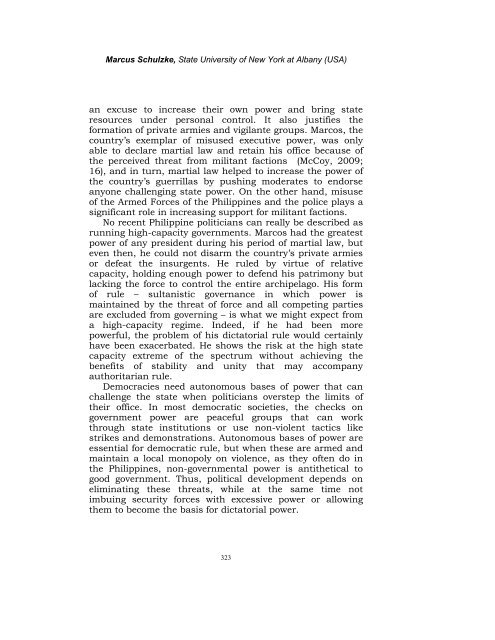View - ResearchGate
View - ResearchGate
View - ResearchGate
You also want an ePaper? Increase the reach of your titles
YUMPU automatically turns print PDFs into web optimized ePapers that Google loves.
Marcus Schulzke, State University of New York at Albany (USA)<br />
an excuse to increase their own power and bring state<br />
resources under personal control. It also justifies the<br />
formation of private armies and vigilante groups. Marcos, the<br />
country’s exemplar of misused executive power, was only<br />
able to declare martial law and retain his office because of<br />
the perceived threat from militant factions (McCoy, 2009;<br />
16), and in turn, martial law helped to increase the power of<br />
the country’s guerrillas by pushing moderates to endorse<br />
anyone challenging state power. On the other hand, misuse<br />
of the Armed Forces of the Philippines and the police plays a<br />
significant role in increasing support for militant factions.<br />
No recent Philippine politicians can really be described as<br />
running high-capacity governments. Marcos had the greatest<br />
power of any president during his period of martial law, but<br />
even then, he could not disarm the country’s private armies<br />
or defeat the insurgents. He ruled by virtue of relative<br />
capacity, holding enough power to defend his patrimony but<br />
lacking the force to control the entire archipelago. His form<br />
of rule – sultanistic governance in which power is<br />
maintained by the threat of force and all competing parties<br />
are excluded from governing – is what we might expect from<br />
a high-capacity regime. Indeed, if he had been more<br />
powerful, the problem of his dictatorial rule would certainly<br />
have been exacerbated. He shows the risk at the high state<br />
capacity extreme of the spectrum without achieving the<br />
benefits of stability and unity that may accompany<br />
authoritarian rule.<br />
Democracies need autonomous bases of power that can<br />
challenge the state when politicians overstep the limits of<br />
their office. In most democratic societies, the checks on<br />
government power are peaceful groups that can work<br />
through state institutions or use non-violent tactics like<br />
strikes and demonstrations. Autonomous bases of power are<br />
essential for democratic rule, but when these are armed and<br />
maintain a local monopoly on violence, as they often do in<br />
the Philippines, non-governmental power is antithetical to<br />
good government. Thus, political development depends on<br />
eliminating these threats, while at the same time not<br />
imbuing security forces with excessive power or allowing<br />
them to become the basis for dictatorial power.<br />
323

















